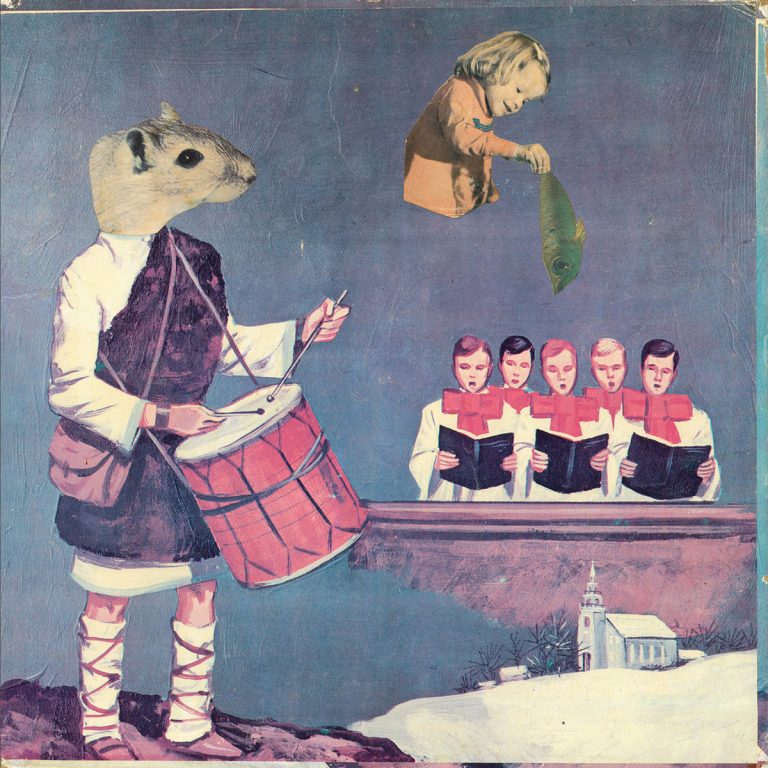Although Spencer Krug hung up the Moonface title in 2018 (that brought us seven individual releases with wide scope between them), he has been just as busy as ever since then. He toured again with Wolf Parade after their return from hiatus, and most notably started up a Patreon page where he released a new song every month (alongside b-sides, reworkings of old songs, livestreams, and improvised jams).
Amongst those monthly-released songs were the 10 that make up Fading Graffiti, Krug’s first new album since 2018, and the first under his own name (as well as the first through his own new humorously-titled label Pronounced Kroog). Ever the re-inventor of his own work, instead of just compiling the songs he already released into one neat package, Krug gathered together a small troupe of musicians to capture “rearranged and re-imagined” versions of his songs, consisting of acoustic guitar, bass, and drums. (Jordan Koop, Adrienne Humblet, Nicholas Merz, and Eli Browning play electric guitar, bass, pedal steel guitar, and drums respectively.) As Krug puts it, he was “transforming [the original songs] from their perhaps complicated, artsy piano structures into something much more folk-rock-pop oriented.”
The result is Krug’s most pared down release to date, and it does a fine job in capturing the Canadian musician at a more homely point in his life (he became a father for the first time last year). While the arrangements might sometimes bend and turn in the way that Krug has always written, they feel much less fussy than you might have found on previous releases; adornment and extra layers are kept to a minimum. Even when he’s showing off his masterful piano skills (the fluttery flourishes on “Winter Sings to Fall”) or recreating a sound not unlike that of recent Wolf Parade albums (the boisterous chorus of “Serena’s Kills”), everything feels much airier and informal, like there’s no high stakes underlying every sentiment.
That’s not to say that there isn’t unease in the lyrics. On the downbeat “Wasted Energy” he mines through feelings of anxiety and paranoia, coming to a familiar conclusion: “There’s nothing here to tear to shreds / There never has been.” On “River River” he declares “The future is just rain / The past is just rain too,” while the title track takes a look at receding memories, and how it’s impossible to remember every detail correctly.
All this nervous energy and worry seems to come to a head on penultimate track “Crossroads”, where Krug wrestles with existential dread both close to home (“I’m at the point where I can’t see the point of making music anymore”) and also from light years away (“Now they’ve gone and made a portrait of an actual black hole / Which of course is just a portrait of a god that wants to swallow us all whole”). Krug has had stark and bare moments on record before (Julia With Blue Jeans On in particular), but here his personal apprehensions and worries seem all the more tangible and real; it’s one thing for a musician to have self-doubt, but it’s another to actually sing about how they need reassurances that their art means something to people.
Contrasting these personal uncertainties is the standout final track “Pin a Wing Above The Door”, which ends Fading Graffiti on a hopeful note, full of musical brightness and a humble, starry feel. Centring in on that settled feeling of comfortable life (“A bathtub and a laptop showing shows that we’ve both seen”) and embracing that the future isn’t certain (“Selling out my music just in case we have a baby”), the track is one of Krug’s best, most mature, and insightful songs, all without fussing too much over the likes of elaborate metaphors.
While Fading Graffiti isn’t expressly an instrument study like previous work (Organ Music Not Vibraphone Like I’d Hoped, Dreamland EP), it could be considered Krug’s ‘guitar album’. Apart from Krug’s own voice, it’s the most prominent feature, going from country-tinged pedal steel to understated indie acoustic anthems. The guitar playing never gets in the way though, and Krug does a fine job of letting any guitar sounds accentuate the song without taking the spotlight, be it the rambling shuffle of “Having Discovered Ayahuasca” to the weary, sun-streaked notes of “The Moon and The Dream”, which feels like a cousin of Moonface’s “Dreamy Summer” in tone and lyrical offerings: “Why does summer always seem as though we’re going nowhere?”
Ultimately, kudos has to be given to Krug for challenging himself and again trying to find new angles from which to approach his music. He could have easily compiled the original Patreon-released versions of these 10 tracks and stuck them together as an album, and no one would have given him too hard a time for doing so. Instead he opted to rearrange them, and the result is something that feels all the more cohesive and connected. (The original versions of the songs put together make for quite a different sounding album.)
Sure, some songs here might land in the middle of the ranking of Krug’s songs (fittingly enough, those at the centre of the album), but equally there is some of his best work here (the final trio of songs in particular). Avid fans will welcome the new versions with open arms, and casual listeners will have their Krug appetites appeased. As it comes to us now though, Fading Graffiti is a welcome and very likeable first step in a new era of releases from Spencer Krug, as he successfully toes the line between making music he wants to make and the music his fans want to hear.

